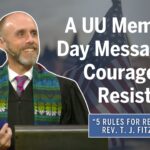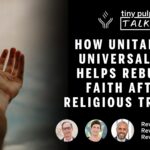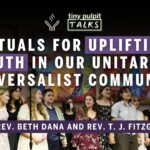Winter’s Faith: Grief, Gratitude, and Generosity, and Justice | Rev. Mary Katherine Morn | 11.19.23
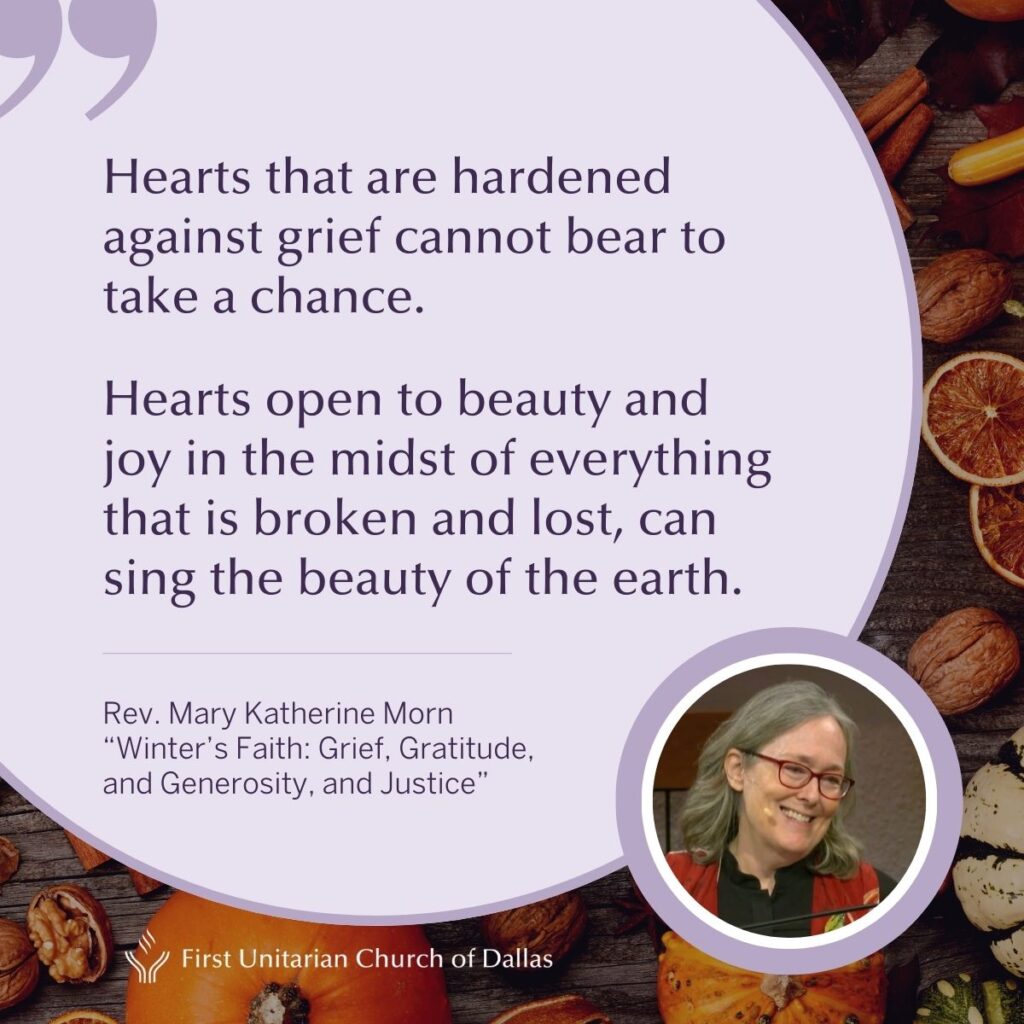
We welcome our longtime friend and President of the Unitarian Universalist Service Committee, Rev. Mary Katherine Morn, as we celebrate the Thanksgiving season together.
Sermon Transcript
Start with Gratitude
Start with gratitude. The chair of UUSC’s Investment Committee started our meeting that way this week, and I loved the plainspoken way, he invited us on the Investment Committee and our discussions about investments to ground ourselves in gratitude for the work. Start with gratitude. I’ll give you a moment. I am grateful for this church.
There is fairly a soul here who remembers my 23-year-old seminarian self, who was your membership coordinator for a minute, youth director one year, but even if you join just two weeks ago, I want you to know that the legacy of this congregation lives in many Unitarian Universalists out there in the world. I am grateful to your ministry team, T. J., for the support and preparing, and Don and help preparing, and Daniel who reached out, even though he would not be here, and Beth, who’s a wonderful colleague for their wonderful ministry and for the support in welcoming the Unitarian Universalist Service Committee and me to be here. I’m grateful for the Women’s Alliances. Am I right? Over 100 years, this is a rare gift in our movement of sisterhood and service, and what a joy to be here on this Sunday when we get to support them in the really wonderful work that they do.
Grief and Gratitude
I am grateful for the gift of our rich religious heritage that calls us to our better selves, challenging us to risk love, to recognize all people as siblings, and to resist ideologies and systems that diminish people and damage our planet. I’m grateful for the teachers who have helped me to see the ways our own heritage, and mine, as a white person from North America, have created and perpetuated systems that diminish people and damage our planet, which brings me to grief, a broken heart. And I have to say these days, if we’re awake, grief arrives early and often. When the hurt, and the fear, and the loss closes in, it can overwhelm, and paralyze, and enrage us. We may be tempted to simply turn away, put our heads in the sand, turn our faces away, or find some drug, whether it’s chemical or behavioral, that temporarily quiets the roar.
Sometimes distraction helps us survive, but if we are called to life, or as the Buddhists say, “Called to wake up,” we have to find ways to be present with grief, to not turn our faces away, and this, my friends, is one of the great gifts of religious community, that we can hold and strive to protect each other in the moments when hurt, and fear, and loss closes in on us. In this container, in this community of care, I invite you to take a moment acknowledging your grief, our grief. Biblical scholar, Walter Brueggemann, observes that there is a very human tension that emerges in the psalms. Actually, it’s kind of a progression of faith. “There are psalms,” he says, “That represent a naive, an immature faith.”
You remember them maybe, “Hey, God, we love You. You love us. Could You please smite our enemies?” And there are psalms that represent the experience of people who have lost faith. “Oh God, why do You persecute us?” And there is a group of psalms that Brueggemann says represent what is a more mature faith.
“Hey God, this is really hard. We’re afraid. We know You love us and that we should love each other, and we praise You for what beauty and joy there is.” Grief and gratitude. Amen.
Working for Justice Against All Odds
I have found this powerful spiritual combination is always present in people who are against all odds, reconstituting the world to be more just, like the global grassroots partners, UUSC has the privilege of working with. Somehow, in their work on the ground, in the middle of things, in deep and trusting relationship, grief and gratitude come together to form a world-changing generosity that looks like justice. It takes the form, really, of a faithful imagining, the ability, the practice of imagining that another world is possible.
Nastya, who I met this summer in Kraków, Poland, was grateful herself to already be out of her home in Ukraine. She was studying in Kraków when the war broke out. This gave her the ability to help the members of her family evacuate safely. When they were all in safe places, she realized her heart was still broken, and especially for the women and girls, and non-binary and trans people, she knew were still at great risk. She wanted them to have family, and so she made them hers. Nastya created an innovative system, actually an app that makes it possible for people who are at risk to connect with her and gives her the ability to connect people who are in need with the support they need out of the country.
Wana, who is one of the leaders of FEM in Nicaragua, works with women facing violence at home and in the streets of her country. FEM provides small plots of land, education in sustainable agriculture, and a radical economic vision that makes it possible for women and families to thrive and stay in their home country where they want to be despite the myriad threats to their lives and livelihoods.
Myra, who I already mentioned, is one of the most grateful people I know. She lost so much as a child and youth of Burma, who escaped violent persecution decades ago, even as numerous members of her family did not. Her work with our partners in Burma, also known as Myanmar, inspires me every day. UUSC partners there have been working for decades to secure a just peace for over 100 ethnic communities, some of whom have faced genocide, some of which are now experiencing violent attacks by the illegitimate military government. Justice rarely comes quickly.
Vishal, a leader with Pacific Island Students Fighting Climate Change, embodies the radical joy and gratitude that I have seen among partners in the Pacific. These are activists and organizers who are facing the loss of their homes, the land they live on due to the outrageous consumption and greed of others, and still, this joy and gratitude is always where they begin. When we were hosting the Pacific Island Students for a forum at United Nations Climate Week a year ago, they were introducing a really important campaign that they had developed, asking the United Nations to direct the International Court of Justice to issue an advisory opinion, setting forth a framework of accountability for nations who have created so much harm. Have you heard of their campaign? Some of you.
We were hosting this discussion last fall before the vote happened in March, and in one of the available business meeting rooms in New York City, during that very busy week, and I was so moved by the great attention and care that Vishal and his colleagues took to create in the space, beauty and joy. So before we got down to our business, we arrived early so that we could arrange the beautiful flowering and green plants that they had brought in the room, and the art that they hung all around because the fight for our climate only makes sense in the context of the beauty of this world and the joy we find. They always remember and always celebrate and lift this up. Their efforts that day, and over the last several years with our little meeting, helped to advance and have resulted in action that the United Nations did indeed take in March of this year. Nastya, Wana, Myra, Vishal have hearts made strong by their willingness to face the grief, their commitment to gratitude, and their practice of generosity.
They show us every day that more justice is possible. It is an incredible gift and privilege to be a part of that with partners, and I hope that those of you who are members and supporters of UUSC feel that joy and privilege as well. The size of your heart is the size of your life. Did you hear the words of the anthem? I thank Don for making that beautiful choice for the anthem.
This is what I have in mind when I speak of winter’s faith, grief, undeniable, gratitude, even so, and generosity even as we usually feel there is so little we can do. Simply, I believe this practice of faith is what makes justice possible, and where there is justice, there is peace.
Feeding the Five Thousand
I want to share one more story, an ancient story that will be familiar to some of you that seems just right as we make our way toward our own grappling with grief, commitment to gratitude, and practice of generosity. This is a story, I believe, shows a way to justice, a story, really, about the building of beloved community. The students were concerned about their teacher.
They knew he was exhausted, and he had recently lost a dear friend, John, who was a baptist, who had been murdered by the police. It’s hard to hold onto hope when the systems that are supposed to protect us are used to criminalize people for their ethnic, racial, or religious identity, systems that violently discourage and silence dissent. Jesus felt this grief deeply. He felt grief for His friend and teacher, John the Baptist, and for the larger community as well. The disciples were concerned, and frankly, they were exhausted and dispirited themselves as well. So when a large crowd appeared, hoping to hear Jesus speak, the disciples encouraged Jesus to send them home.
They needed a break, and besides, pretty soon, everyone was going to be hungry. Well, Jesus wasn’t convinced and even went so far as to suggest that the disciples should gather food and feed the crowd themselves so that all would be fed. Well, the students knew there was not enough food. I wonder if they argued with him. Surely, they felt fear that the crowd might become unruly and that there might be violence.
“You feed them,” Jesus said. What happened next varies, depending on the version of the story you look at, but in all of the accounts that we have, one thing is consistent. When the rations were gathered, five loaves and two fishes, the disciples brought them to Jesus, Jesus gathered them up, and He prayed. The text doesn’t tell us the content of the prayer, but I’m pretty sure, aren’t you, that Jesus said a prayer of thanks. He gave thanks.
He received what appeared to everyone else as inadequate, and He gave thanks. Then, Jesus told them … This may be a detail you’d missed, but I promise you, it’s there. Then, Jesus told the disciples to gather the crowd in groups of 50 and have them sit together in groups on the grass, on the dirt. On the dirt. Let’s say dirt.
It’s an organizer’s dream scenario, or maybe it was the first small group ministry. Hearing the voices of some of my organizer friends, I imagine Jesus saying, “Look, I know the crowd is large and strangers are sometimes unkind, but we have a problem to solve.” You know that these are all children of God. Help them discover each other as kin. If you help, they will find each other, discover their connections, see each other as precious, and when that happens, anything is possible.
Sitting together on the grass, they did just that. They met someone from a neighboring village. They heard the challenges of the journey from another stranger. They recognized someone in need, or simply shared a laugh. Strangers no longer.
Building Beloved Community
In the midst of the community that they created and the words of thanksgiving offered despite all odds, they were moved to open their hearts and their bags. They traveled all day, right? Surely, not without provisions tucked away just in case they were moved to open their hearts and their bags to share the food they had brought. Hidden treasure became shared treasure, as it does when we see each other and recognize each other’s need. When they realized that strangers might be friends, indeed might become beloved community, when they remembered this, there was enough food. There was more than enough love.
It was a miracle. Hearts that are hardened against grief cannot bear to take a chance. Hearts open to beauty and joy in the midst of everything that is broken and lost, can sing the beauty of the earth. Hearts opened recognize that we are kin, one and all, that we only survive, we only thrive together. Hearts opened give and receive with ease and with grace. May our winter’s faith carry us and call us to the work of justice, and to the building together of a world that knows peace. May it be so. Amen.
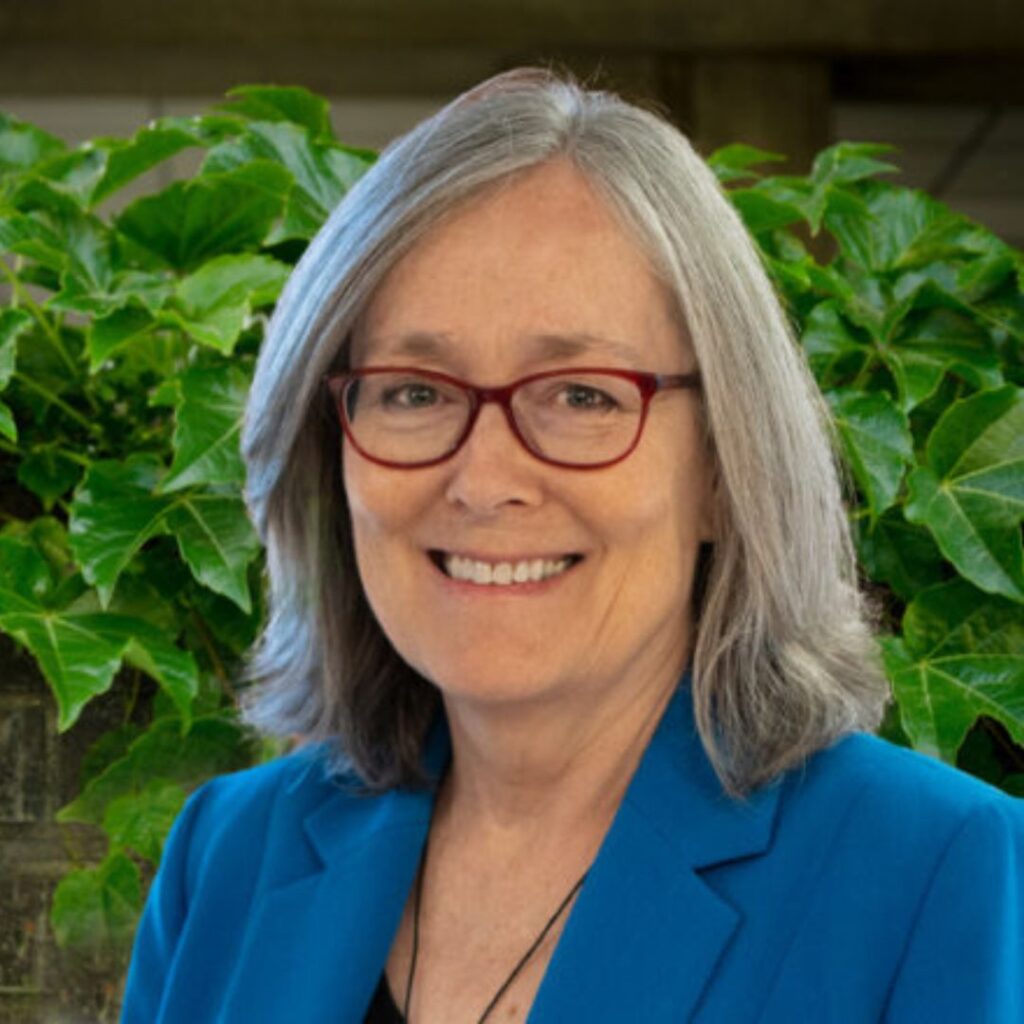
About Rev. Mary Katherine Morn
After 30 years in faith-based leadership, the Rev. Mary Katherine Morn joined UUSC as President and Lead Executive Officer in 2018. She has helped to grow a number of progressive congregations serving their members and the larger community.
Mary Katherine contributed to efforts for economic, racial, and social justice in Macon, Georgia at the Economic Opportunity Council/Headstart with the NAACP. She also worked deeply in the reproductive justice movement. In Nashville, Tennessee, she collaborated with the Interfaith Alliance and Industrial Areas Foundation. In Fairfax, Virginia, she worked with interfaith ministries addressing hunger and homelessness, collaborated with LGBTQI+ advocacy organizations, and served on the county’s homelessness task force.
Mary Katherine also served in volunteer leadership with the Unitarian Universalist Ministers’ Association and for four years as Director of Stewardship and Development for the Unitarian Universalist Association.




